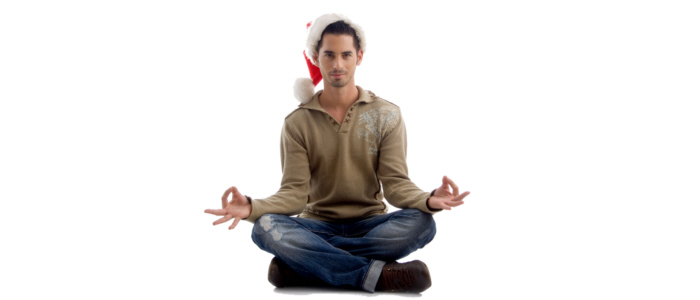Cultivating a Buddha Brain for Holiday Happiness
by Kari Henley
Well, there’s less than a week til Christmas — how’s everyone doing out there? The United States is Christmas-crazy, and whether you celebrate or not, it is impossible to escape the effects. Holiday music blares on the radio 24/7, the weather in much of the country is freezing, it is pitch black at 5 p.m., the malls are jam-packed with crazed people racing around, parking lots are jammed, budgets are tight and tempers short.
A friend of mine has an old family motto: “It isn’t Christmas until somebody cries.” So sad, but it is often true. We fill our minds with expectations of elevated family gatherings, anticipate receiving a special gift, become attached to how others will react to our gifts and anxiously try to create an idyllic atmosphere that often takes more energy, time and money than we have.
My friend and fellow blogger Dr. Cara Barker has been exploring the pain of the holiday season in her past two posts, reflecting on the deep pain of unresolved relationships, loss and suffering that the holiday season may bring. Dr. Judith Rich has been writing on releasing the addiction to Christmas consumerism, and the joy of the no-gifts ritual she has created with her family.
As a mother of four, I find this season to be incredibly stressful: getting to all the holiday concerts during work hours, bringing in canned goods, “adopting” a struggling family, baking for the firemen, buying teacher gifts (don’t forget the bus driver), racing to the mall to get the last of the Lego Power Miners before they sell out, agonizing over what to buy for a picky tween girl, remembering that the office party is tomorrow with no babysitters in sight, and groaning when the daily mail brings piles of amazing professional holiday cards of family perfection. So much is truly “inner suffering” of the mind, as the stress is self-created.
On a bright note, we are close to winter solstice, the longest night of the year. The solstice represents a time for contemplation, lighting candles and rejoicing for the return of light. Auspiciously, the evening of the solstice is also marked by a full lunar eclipse, another great darkening and re-emergence of light.
The contrast of modern holiday mania with the soft beckoning of the solstice is palpable in my own body. I simultaneously feel the longing to sink into myself, yet I also feel sucked into the frantic pace of the season.
The Shift Network offered a powerful teleseminar over the weekend to honor the solstice, with nearly 1,000 people sharing prayers, songs and wisdom with two indigenous grandmothers. Clearly, we seek wisdom during this time. Maybe once Santa dies down in our childhood images, we should replace the wrapped packages from the North Pole with inner gifts from a wise grandmother, or maybe the “jolly old” Buddha?
This week I read a wonderful book called “Buddha’s Brain: The Practical Neuroscience of Happiness, Love and Wisdom“ by Dr. Rick Hanson. I wondered: how would the Buddha handle modern holiday stress?
Dr. Hanson’s research shows that our mind can literally affect the brain, meaning the thoughts we cultivate actually change the physical makeup of the brain in the same way physical exercise builds particular muscles. While many of us think of the holiday season as a happy time, our mind is trained to focus on negative memories, to “suffer” or amplify negative experiences rather than positive ones — hence why it is not really Christmas until somebody cries.
Hanson has found that this negative bias can be reversed with careful time and attention and offers many practical tips in his book, website and wonderful weekly newsletter. I had a chance to speak with Dr. Hanson this week and asked him to share a “Buddha’s brain” perspective on how to reverse some of the stress and strife so prevalent today and truly enjoy the holiday season.
- Monitor Your Stress Level.
“Let’s face it, this time of year is really stressful!” said Hanson. “Just look around at people who are walking around preoccupied in their own world. If you get into it, they get mad at you! It is an intense time, and low-grade chronic stress is very hard on the body.”Here are three tips to “cool the fires” of stress:
- Take three long exhalations. This activates the parasympathetic nervous system and helps the body to understand that it is safe to calm down.
- Relax the tongue. It quiets the digestive system that activates during stress.
- Remind yourself that you are indeed safe. Dr. Hanson uses the term “paper tiger effect” to refer to those times when our minds respond to stresses as if they were physical threats reminiscent of the saber-toothed tigers of our ancestors. Let’s face it: a traffic jam is not going to end your life, so calm down!
- Have Compassion for Others.
“We can see the suffering of others just by looking at their faces,” said Dr. Hanson, “including the everyday weariness, or the ‘nicks and bruises’ of life. We can see it in everyone — and in ourselves when we look in the mirror. Taking the time to notice actually helps us to feel safer, calmer and more compassionate, and allows us to open our hearts towards greater love.”I practiced this tip at an outlet mall — it was quite profound to get out of my own mind, look into strangers’ eyes and see their implicit suffering. It shook me out of my tape-loop and moved me deeply.
- Receive.
Open up to receive and honor what has been given to you this year in so many ways. “We can honor the good intentions of the people around us who want to share happiness,” said Hanson. Being mindful of our inner world allows room for self-compassion, healing old wounds and being more secure while being close with others. - Focus on the Generosity that Underlies This Season.
“We can honor the larger culture that focuses on emotions like generosity, kindness and gratitude during the holidays. Even if it is commercial, there is still sincerity mixed in there,” said Hanson. “From there, we can open up to the world, appreciating the un-earnable generosity of every breath, every sunrise — take it in! This practice helps defeat the negative bias of the brain and builds resources to be happier all year long.”
Maybe everyone’s brain is a natural Ebenezer Scrooge at heart, with an ability to draw in the negative like Velcro and rebound the positive like Teflon. Yet a contemplative practice is like having Tiny Tim’s energy dawn within like solstice light, letting the famous proclamation, “God bless us, every one!” sink into wounds like ancient salve. The grandmothers ask for prayers, and the Buddha asks for loving kindness.

Kari Henley, Founder, Age Without Borders
Age Without Borders powers global community with digital engagement. They are a boutique virtual events company and a hub of Education, Innovation and Solutions. Check out www.agewoborders.com to join the global movement to grow, connect and thrive through the ages.

